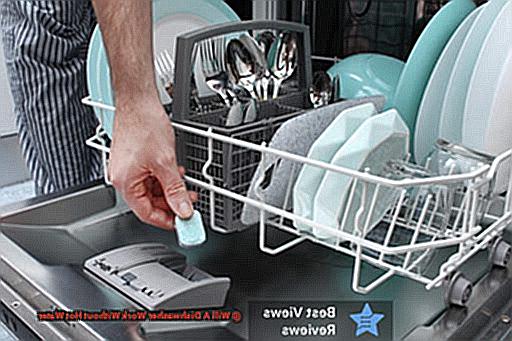Are you exhausted from scrubbing away at dirty dishes for hours on end? Do the words “hot water” make you cringe, knowing it’s not eco-friendly or budget-friendly? Well, hold onto your sponge because I have some exciting news for you.
Enter dishwashers without hot water – a revolutionary technology that is transforming the way we tackle our dirty dishes. But don’t just take my word for it. Here are some key points to consider:
- Time-saving: No more slaving over a sink full of suds and scalding water. Simply load up your dishwasher and let it do the heavy lifting.
- Cost-effective: By nixing the need for hot water, these dishwashers can significantly slash your energy bill.
- Eco-friendly: Less energy consumption means less harm to our planet – a win-win situation.
- Equally efficient: Despite popular belief, dishwashers without hot water are just as effective at washing dishes as their traditional counterparts.
So why not hop on board with this innovative technology and witness firsthand how it can simplify your life while also being kind to Mother Earth? Keep reading to discover more about this game-changing invention and its multitude of benefits.
Contents
How does a dishwasher work?
A dishwasher has various essential components such as the water inlet valve, pump, motor, heating element, detergent dispenser, and spray arm that work together in a specific order to effectively clean dishes.
The first step in this process is pumping water into the machine through the water inlet valve. Once inside, the heating element warms the water to a temperature of approximately 120-140°F. This hot water is then circulated by the pump through the spray arm, which sprays it onto the dishes to remove any dirt or grime.
To aid in the cleaning process, the detergent dispenser releases detergent into the hot water. This helps to break down food particles and grease, resulting in a thorough cleaning of the dishes. The combination of hot water and detergent effectively removes any stubborn stains on the dishes.
The spray arm continues to circulate the hot water and detergent over the dishes until they are completely clean. After washing, the heating element can also be utilized to dry the dishes.
Some dishwashers also have a filter that captures any food particles or debris that may have been missed during the washing process. It is important to regularly clean this filter to ensure that the dishwasher functions properly.
Each component plays a crucial role in ensuring that your dishes are cleaned effectively. Without hot water, the cleaning process may be less efficient, and without a functioning heating element, drying may not occur.
Can I run my dishwasher without hot water?
Running your dishwasher without hot water may have unfavorable effects on the cleanliness of your dishes and the proper functioning of the dishwasher itself. Here are some potential consequences to keep in mind before choosing to run your dishwasher without hot water:
- Insufficient Cleaning: Hot water is crucial for efficiently cleaning dishes and eliminating any food particles or bacteria. Without hot water, dishes may not come out as clean as desired and harmful bacteria could still remain on them after the washing cycle.
- Damage to Dishwasher Components: The dishwasher’s pump and heating element can be damaged if you run it without water. The pump relies on water to work properly, and without enough hot water, the heating element can overheat and cause damage.
- Potential Fire Hazard: Running a dishwasher without water can also pose a fire hazard. Without enough water to regulate its temperature, the dishwasher can overheat and potentially start a fire.
- Increased Energy Consumption: Opting for cold water instead of hot water in your dishwasher will result in longer heating times for the water. This can lead to higher energy consumption and a more expensive electricity bill.
In summary, running your dishwasher without hot water can result in inefficient cleaning, damage to important components, a potential fire hazard, and higher energy usage.

What are the risks of running your dishwasher without hot water?
When operating a dishwasher, the inclusion of hot water is crucial.
This is because hot water plays a vital role in dissolving and activating dish detergent which, in turn, makes it more efficient in breaking down food particles and eliminating grease from dishes. Moreover, hot water also aids in sanitizing dishes by killing any bacteria or microorganisms that may be present.
Without the use of hot water, there is a high possibility that your dishes will not be thoroughly cleaned, potentially posing a health risk if consumed.
What alternatives are there?
When it comes to running a dishwasher, using hot water is the most efficient method. However, there are alternative methods available if hot water is not an option. Keep in mind that these methods may not be as effective and may result in inadequate cleaning and sanitization.
- Manually heating the water: One way to run a dishwasher without hot water is to manually heat the water before pouring it into the machine. This can be done by boiling water on the stove or using a microwave-safe container. Once heated, carefully add the water to the dishwasher and start the cycle.
- Dishwasher-safe sanitizing rinse aids or tablets: Another option is to use dishwasher-safe sanitizing rinse aids or tablets. These can be added to the dishwasher along with detergent and help sanitize dishes without the need for hot water.
- Adjust temperature settings on the dishwasher: Some dishwashers have temperature settings that allow users to lower the temperature of the water used in the cycle. This can reduce energy usage while still providing adequate cleaning.
- Invest in an energy-efficient dishwasher: For a long-term solution, consider investing in an energy-efficient dishwasher. These models are designed to use less hot water while still effectively cleaning dishes.
| Alternative Method | Description | Pros/Cons |
| Manually heating the water | Boiling water on stove or using microwave-safe container to heat up water before pouring into dishwasher. | Pros: Can save energy and money.
Cons: Time-consuming and may not provide adequate cleaning or sanitization. |
| Dishwasher-safe sanitizing rinse aids or tablets | Add to dishwasher along with detergent to sanitize dishes without hot water. | Pros: Easy to use.
Cons: May not be as effective as hot water in sanitizing dishes. |
| Adjust temperature settings on dishwasher | Lower temperature setting to reduce energy usage. | Pros: Can still provide adequate cleaning and save energy.
Cons: May not fully sanitize dishes. |
| Invest in an energy-efficient dishwasher | Designed to use less hot water while still providing effective cleaning. | Pros: Long-term solution that can save energy and money.
Cons: Upfront investment required. |
Conclusion
In conclusion, the invention of dishwashers without hot water has revolutionized the way we handle our dirty dishes.
These innovative appliances not only save time and money, but also have a positive impact on the environment. By eliminating the need for hot water, they significantly reduce energy consumption and are just as effective at cleaning dishes as traditional dishwashers.
However, it is important to note that running a dishwasher without hot water can lead to inadequate cleaning and potential damage to the machine. But fear not, there are alternative methods available such as manually heating the water or using dishwasher-safe sanitizing aids.
For a more sustainable solution, consider investing in an energy-efficient dishwasher with an internal heating element.





